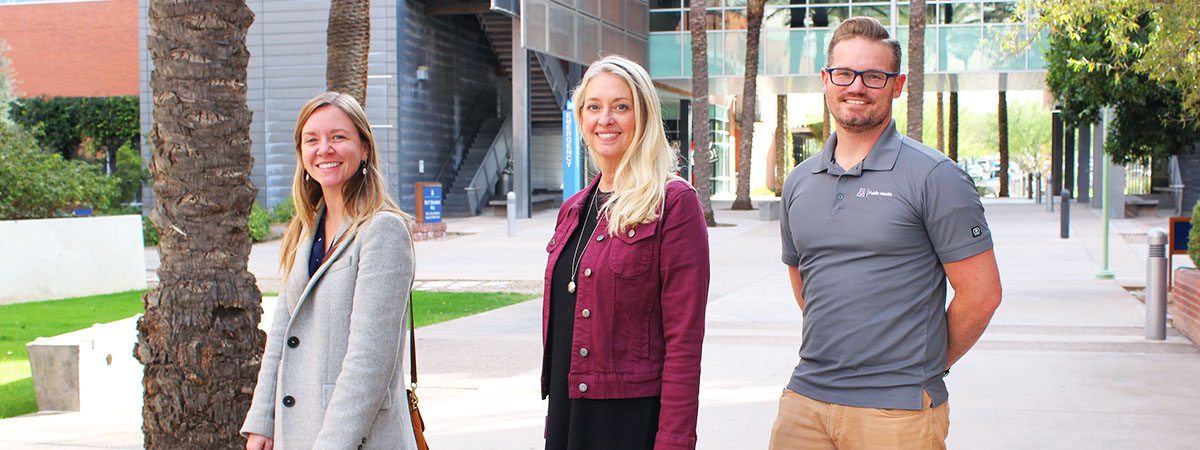Public Health Training Center Welcomes New Leadership

Members of the Western Region Public Health Training Center Team, left-to-right: Abby Stoica, MPH, Associate Director, Kelly Reynolds, PhD, Director, and Erich Healy, BA, Online Designer.
The federally funded Western Region Public Health Training Center serves public health professionals across a large portion of the Western US and Pacific Islands, and the Center recently transitioned to new leadership under Dr. Kelly Reynolds who brings impressive experience and expertise to her role as director.

Dr. Kelly Reynolds
The Western Region Public Health Training Center (WRPHTC) might be one of the best-kept-secrets of the Zuckerman College of Public Health, and yet we all benefit from the work they do! Thanks to the efforts of the WRPHTC, thousands of public health professionals and community health workers in the western United States have taken online training courses to improve their knowledge and skills. These trainings, developed and delivered by WRPHTC in collaboration with topic experts, keep our public health professionals up-to-date on current best practices in the fight against emerging health threats.
Funded by the Health Resources and Services Administration (HRSA), and partnered with the college, the Training Center has built an impressive track record since it was first funded in 2010. Now, under the new leadership of Dr. Kelly Reynolds, the Training Center will continue to deliver the best professional development training based on the current science, expand its audience and partnerships, and innovate to support our public health workforce.
“The trainings provided by the Center are so important for our public health workforce. As we have seen over and over during COVID, circumstances change and our professionals need to learn and adapt,” said Dr. Reynolds, “We are so fortunate that HRSA funds the Regional Public Health Training Centers program and understands the vital role that our public health professionals play to deliver the services and information we need to overcome this pandemic.”
Outstanding Record of Service
Over the past decade, the Training Center has developed a network of partners across universities, public health institutes, and other community-based organizations to deliver innovative, skill-based training on critical public health topics. Topic areas for the WRPHTC courses range from nutrition, obesity, mental health, and opioid use to COVID-19 prevention, health equity and policy development. To date, more than 4,500 free courses have been offered through WRPHTC, with roughly 250,000 student enrollments!
In addition to the training services, the WRPHTC provides stipends to support students conducting community-based health projects (undergraduate juniors and seniors, and graduate students). The Training Center also creates and implements custom online public health core competency and training needs assessments for public health organizations. Over the past several years, the WRPHTC has conducted training needs assessments with more than 3,000 public health employees in the US western region. Those needs assessments provided valuable information about the demographics, training needs, and competencies of public health departments, and additionally supported the accreditation process for local health departments.
Former Director Dr. Doug Taren Retires
For many years, the Training Center has been guided by Dr. Douglas Taren who has now retired from the Zuckerman College of Public Health after a long and successful career. Under Dr. Taren’s direction, WRPHTC grew from its beginnings in 2010 as the Arizona Collaborative Public Health Training Center into HRSA’s Region 9 Public Health Training Center (Western Region), refunded in 2014 and 2018, to serve a large Western Region that consists of Arizona, Nevada, California, Hawai’i, and the US-affiliated Pacific Islands. Federal funding received by WRPHTC has thus far totaled more than $10 million.
All of us in the college will miss Dr. Taren both personally and professionally. As the former Associate Dean for Academic Affairs and former Director of the WRPHTC, Doug inspired us as an outstanding educator, leader, and public health champion. He was instrumental in the growth and success of the college and the Training Center. Doug has moved to a new research position in pediatric medicine at the University of Colorado Boulder where his wife has taken a new position.
Dr. Reynolds Brings Experience and Expertise
With Dr. Taren’s retirement comes an exciting transition for the Training Center to new leadership under Kelly Reynolds, PhD, MSPH, Professor and Department Chair for the Community, Environment & Policy Department at the college, and Director of the Environment, Exposure Science and Risk Assessment Center (ESRAC). Dr. Reynold’s expertise on infection control and risk assessment, along with her extensive collaborations with healthcare professionals, first responders, and environmental health services, opens new opportunities for WRPHTC to provide emergency preparedness and response trainings as the public health workforce continues to the battle against COVID-19.
In collaboration with the Centers for Disease Control and Prevention (CDC) and the National Network of Public Health Institutes (NNPHI), Dr. Reynolds recently developed an WRPHTC training focused on Legionella prevention in hospital and large building plumbing systems. Early on in the COVID-19 pandemic, she also led the development of an infection reduction training video for first responders that has received over 20,000 views on YouTube!
Building on the solid foundation developed by Dr. Taren, and with Dr. Reynolds’ leadership going forward, WRPHTC will continue to play a critical role, supporting our public health workforce so they can provide informed, quality services to diverse communities in the western United States. To effectively pursue that mission, in addition to professional development related to chronic disease prevention and treatment, the Training Center will provide guidance on other public health challenges such as pandemic preparedness, social determinants of health, and preparation for public health emergencies.
In concert with those goals, to promote the skillful use of data to improve public health outcomes, the Center will provide training on health equity data collection and use, including data analytics and crowdsourcing. Moving forward, the WRPHTC further plans to emphasize the need to connect and integrate primary care and public health professionals through the strategic development of Leadership Institutes and student field placement projects, all developed to support a diverse stakeholder population. As the tools, needs, and opportunities to deliver the best possible public health continue to change the Training Center will adapt to meet the future.
“Dr. Reynolds experience and skills make her an ideal leader for the Training Center,” says Iman Hakim, MD, PhD, MPH, Dean of the Zuckerman College of Public Health, “she already knows the value of the courses they offer, she has developed trainings with the center and seen the benefits. With her passion for public health, Dr. Reynolds will lead the Training Center to guide our public health workforce into the future.”
Overview – Public Health Training Center Program
The WRPHTC is one of ten Regional Public Health Training Centers (RPHTCs) funded by the Health Resources and Services Administration (HRSA). The Training Centers individually and collectively provide specialized training for public health students and professionals to support the current and future needs of our national public health workforce. Trainings often focus on new science and current health challenges. Courses cover the following skill areas: 1) Technical Skills 2) Scientific Skills 3) Leadership Skills.
The WRPHTC serves as an accredited provider of Continuing Professional Education Units (CPEUs) that are available to all Registered Dietitians/Nutrition and Registered Dietetic Technicians. In addition, the Training Center provides accredited Continuing Education Contact Hours (CECH) that are available to all Certified Health Education Specialists (CHES), and in 2020 more than 3,300 CHES participants took courses.
You can follow the Training Center on social media through their Facebook, Instagram, and Twitter accounts.

